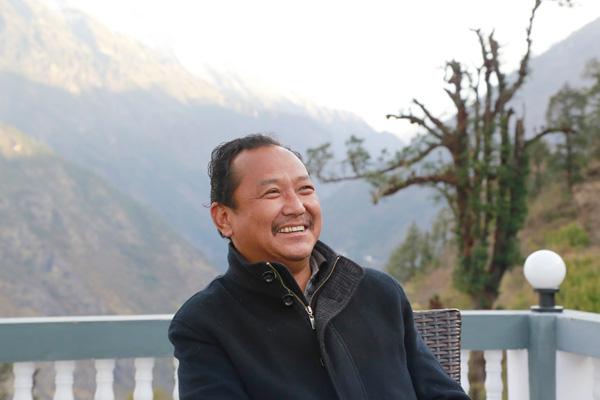Villager returns home to open businesses
Updated: 2015-04-24 11:25
By Da Qiong and Palden Nyima(China Daily USA)
|
||||||||
 |
|
The first university graduate from his village, Phurba hopes his businesses can bring benefits to his fellow villagers. |
"Khasa Port is an opportunity for us. I have experienced many ups and downs, but I have never given up, and finally I succeeded," Phurba said.
He has kept to his original plan and has supported several children of his relatives for their schooling over the past two decades.
"Thanks to the support from Phurba, I did not meet any economic difficulties at school," said Mantsi Droma, one of Phurba's nieces.
Phurba spent six years at Khasa Port trading across the border and four years in Nepal running a medicine business in the 1990s.
Phurba made yet another change three years ago, when he shifted his focus on border trade to tourism.
His home village of Lixin is on a slope near one of the Himalayan valleys, with good ecological features, attractive landscapes and the unique Sherpa culture.
As the neighboring Khasa Port receives more and more tourists, the name of Lixin village is gradually becoming better known.
Phurba predicted the village would soon become a tourism attraction, and built an inn in a mix of Nepali and European styles in 2014. It is the first family-owned inn in the village.
Following Phurba's example, the number of family-owned inns has increased to 10, and five restaurants opened within a year.
As the local government has planned to turn the village into to a tourist destination since some years ago, it has invested heavily in tourism infrastructure construction.
Construction of a 13-kilometer-long road costing more than 36 million yuan ($5.8 million) began three years ago, and it is scheduled to be completed late this year.
"When the road is ready, our village will welcome more tourists," Phurba said.
The village's attractions include snow-capped mountains, primitive forest, its old religion and the customs of the Sherpa people.
As many towering oaks grow around Phurba's inn, he named it Oak Inn.
Currently, the inn has eight staff, including a Nepali cook and waiter.
With 20 beds and other catering services, Phurba's inn earned more than 150,000 yuan in its first year.
The village officials helped Phurba with the design and decoration of his inn, and he received more than 500,000 yuan from the government.
More than 10 households in the village jointly invested in the inn.
Phurba plans to expand his business in years to come by developing a vegetable farm and a chicken breeding center in the village.
"I hope as my business gets bigger, I could provide more employment to villagers," he said.
- Are you prepared to welcome the second royal baby?
- Spain recalls Venezuelan ambassador over Maduro conspiracy comments
- Anniversary of Armenian massacre marked
- DPRK to establish 2nd intl tourist zone
- Parade rehearsal held for Victory over Fascism in Russia
- Kim likely to visit Russia in May for war victory ceremony

 Stunts, Parkour, Action!
Stunts, Parkour, Action!
 City starting to close gap with world fashion capitals
City starting to close gap with world fashion capitals
 Across America over the week (from April 17 to 23)
Across America over the week (from April 17 to 23)
 Honored for community work
Honored for community work
 5th Beijing International Film Festival closes
5th Beijing International Film Festival closes
 Top 10 auto lookalikes in China
Top 10 auto lookalikes in China
 Flights cancelled as ash cloud pours from Chile volcano
Flights cancelled as ash cloud pours from Chile volcano
 Unusual but true: Kung fu girl stuns TV show judges
Unusual but true: Kung fu girl stuns TV show judges
Most Viewed
Editor's Picks

|

|

|

|

|

|
Today's Top News
Ho Feng Shan: A man of compassion, courage
The real Apple Watch goes on sale Friday in China, US
China looks to top the bill in Hollywood productions
Panda to be inseminated via China
Chinese mourn passing of US officer
Sino-US nuclear cooperation proposal lauded
Furious 7 on track to be tops in China
As PayPal split looms, eBay plans to think small
US Weekly

|

|







